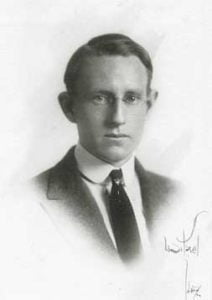But for our purposes this week, it is most significant to note that he was raised on the mission field, the fourth child born to the Rev. George R.M. Gilchrist and his wife, Ruth Sanborne Gilchrist. Rev. Gilchrist and his wife were career missionaries in Chile from 1925 until their retirement in 1959, and it is a portion of their story that Dr. Gilchrist will be telling this week.
GILCHRIST IN CHILE, Part 1.
by Dr. Paul R. Gilchrist, former Stated Clerk of the Presbyterian Church in America.
The Rev. George R. M. Gilchrist and his wife Ruth Sanborne Gilchrist served as missionaries in Chile, the long string-bean country on the Pacific Ocean side of South America, from 1925 to 1945. Both were born in the Presbyterian Church, USA (Northern) continuing the tradition of several generations of pastors, missionaries and teachers. They served mission churches in the Central Valley in the towns of San Fernando, Rancagua and Linares. They were much loved and saw fruit for their labors in seeing many come so saving knowledge of the Lord Jesus Christ through evangelism and Bible study. They identified themselves as “Evangelicals” rather than “Protestants” since there were many modernist leaning groups identifying with the later designation as in contradistinction from the Roman Catholic Church.

But on May 18, 1944 the storms of modernism vs. Bible believing conservatism in the Presbyterian Church came to a climax that forced the Gilchrists to resign from the Mission Board as well as from the Chile Presbytery. On that date, the Presbytery held an extraordinary meeting to deal with a pastor, Olivero Maufras, and a missionary, George Gilchrist, who were involved with a “Grupo Accion Evangelica.” They had disobeyed orders from a previous presbytery meeting directing them to “cease and desist” their activities and disband the GAE. And so the Presbytery took the disciplinary action of suspending their ministerial credentials until the January 1945 meeting of Presbytery. But what was their sin? Disobeying the formal demands of a previous Presbytery.
To understand this, consider the modernist—fundamentalist clashes mounting in the 1930s. Pearl Buck, a missionary in China, read and strongly supported the 1932 book Re-Thinking Missions, a book which undoubtedly also influenced Horacio Gonzales, a very influential ruling elder in Chile, who wrote in a similar vein in “Our Presbyterian Situation” in August of 1936. He wrote a chapter on “Religion in a changing world” critical of the evangelical message, “Our religion has dulled the mind” and “we have a wrong vision with errors in the method, the message, etc. which must be changed to meet modern times.” He further stated: “Our doctrinal concepts are molded in terms appropriate to past centuries. …These concepts are too small for the present mentality. Those antiquated ideas are an obstacle to the acceptance of our faith on the part of educated people.” And so he proposed “a revision of the creed and concept of the message, a renovation of the ethical and spiritual values, and a re-interpretation of the essentials of the faith.”
to be continued Tuesday . . .
Words to Live By:
Thus says the LORD: “Stand by the roads, and look, and ask for the ancient paths, where the good way is; and walk in it, and find rest for your souls. But they said, ‘We will not walk in it.’–Jeremiah 6:16, ESV.
Pastor Olivero Maufras and missionary George Gilchrist, along with the “Grupo Accion Evangelica,” in Chile, were seeking to be faithful to the ancient paths set out by the Lord in the Scriptures of the Bible. They sought to faithfully proclaim the Gospel of salvation by grace alone, through faith alone, in the Lord Jesus Christ. And as we have seen, they were opposed by those who said ‘We will not walk in it.‘ It is an old story and it remains a grievous one, when the Gospel is refused. Remember to pray for our missionaries and for Christians around the world, who face great opposition as they seek to proclaim the Good News.
